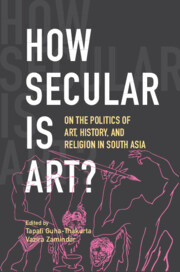9 - Can a Festival of a Goddess Be ‘Secular’?
Published online by Cambridge University Press: 21 February 2023
Summary
What defines the secular in a cultural festival in Bengal that centres on the annual homecoming of Goddess Durga? How may we read the rhetoric of secularization of this event that has a long historical background and has become crucial to its contemporary identity? In keeping with the title of this volume, a question mark necessarily hovers around the nomenclature of the ‘secular’ and the extent to which it may lend itself to the profile of a festival that has well outstripped its religiosity and willed its transformation into Kolkata’s biggest public art event. Defying any easy placement within an institutionally secure realm of either religion or art, and never fully measuring up to the criterion of the secular, the Durga Pujas provide a powerful site for the interrogation of each of these conceptual categories. I will be arguing that the contemporary festival of Durga in Kolkata (and the ideas and forms it exports to Durga Puja celebrations across Bengal and other big cities of India) offers itself not just as a case study but as a constitutive ground in the dismantling of boundaries between artistic, religious, and secular practices, allowing each of these to freely trespass into each other’s domains. This sense of trespass is not one that comes from within the field of festival art and its creative protagonists. It erupts more within the fields of scholarship and disciplines such as art history and religious studies. It is in the spaces of these disciplines that the need to redefine the normative domains of art, religion, and secularity has gone hand-in-hand with the urgency of maintaining their separate jurisdictions and their different rights and prerogatives. It is important, in this context, to mark the coming of age of the field of South Asian visual studies and its tendentious criss-crossing of the disciplines of art history, visual anthropology, and the study of ritual, religion, and material cultures; and to situate my turn to the changed artistic contemporary proclivities of Kolkata’s Durga Pujas within this shifting disciplinary confluence in the initial decades of the twenty-first century.
As a mega urban spectacle that has been engaging with a spectacular array of art and craft productions, new visual technologies, and social media, the city festival holds out an invitation to the field of visual studies that is hard to resist.
- Type
- Chapter
- Information
- How Secular Is Art?On the Politics of Art, History and Religion in South Asia, pp. 261 - 296Publisher: Cambridge University PressPrint publication year: 2024



